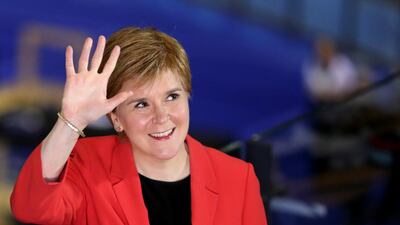The Scottish National Party (SNP) on Saturday appeared likely to fall short of its goal of an absolute majority in the devolved parliament as it pushes for a new independence referendum - a plan condemned as reckless by prime minister Boris Johnson.
The SNP had promised to seek a fresh referendum on independence, a move which could reshape the UK, if it gained a majority.
Final results of Thursday’s election showed the SNP winning 64 of the 129 seats - one short of the 65 they wanted - in the Edinburgh-based Scottish Parliament.
Another referendum vote could still be on the table if it join forces with a rival, such as the Green Party.
Scottish Green’s co-leader Lorna Slater said although they have not had discussions with the SNP over a potential coalition, there will still be a “clear mandate” for the Scottish people to be asked if they would like a referendum.
The SNP had said it would seek to hold a new vote on secession by the end of 2023 if a pro-independence majority was returned to the devolved 129-seat parliament.
“[The SNP] appears to be on course for a fourth consecutive election victory and to be on course to have the privilege of forming a government again,” Nicola Sturgeon, Scotland's first minister and SNP leader, had said.
"If that is indeed the outcome of this election, I pledge today to get back to work immediately to continue to steer this country through the crisis of Covid, to lead this country into recovery from Covid.
"And then, when the time is right, to offer this country the choice of a better future."
By Saturday afternoon the SNP had won 60 of the first 71 seats and the final results were due later in the evening.
As the votes were still being counted, Ms Sturgeon warned Mr Johnson he would be “picking a fight with the democratic wishes of the Scottish people” if he tried to block a referendum vote.
Earlier, the SNP had failed to win the key battleground seat of Aberdeenshire West, a result that commentators say makes their chances of winning an outright majority in the Scottish parliament very unlikely.
In some areas there was an increase in support for opposition pro-union parties, indicating the final outcome would be very close, with some seats allocated on a separate proportional representation system.
The final results are not expected until later Saturday.
Deputy First Minister John Sweeney told BBC Radio 4 on Saturday that an overall majority "was always a very, very challenging mountain for us to climb".
He predicted the Scottish parliament would however have a majority of members "committed to the holding of an independence referendum."
Ms Sturgeon said it had always been a "very, very long shot" for her party to win an outright majority under the country’s proportional-representation electoral system.
Britain's exit from the European Union - a move opposed by an overwhelming majority in Scotland - a perception that the Scottish government has handled the Covid-19 crisis well, and antipathy to Mr Johnson's Conservative government in Westminster have all bolstered support for the independence movement.
Scots voted by 55 per cent to 45 per cent in 2014 to remain part of the UK, in what pro-unionist parties say should be a once in a generation vote. Polls suggest the outcome of a second referendum would be too tight to call.
In England, the UK's Conservative Party won a crushing victory in the northern town of Hartlepool, breaking Labour's decades-long hold on the seat and strengthening Prime Minister Boris Johnson's grip on working-class areas.
London was also voting for its mayor and local authority but results are not yet in.
Labour's Sadiq Khan, who has been in office since 2016, has 39 per cent of first preference votes, while Conservative candidate Shaun Bailey has 37 per cent. Second preference votes have not yet been counted.

